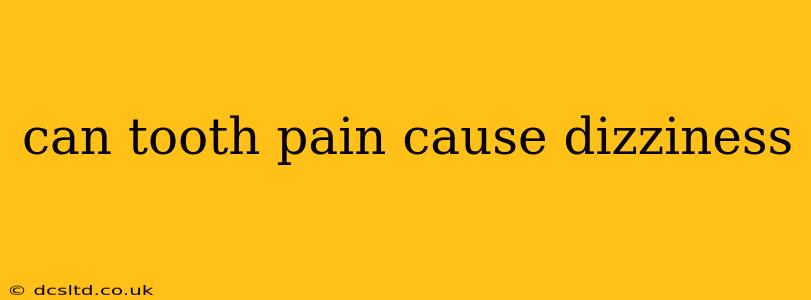Toothaches are undeniably unpleasant, causing throbbing pain, sensitivity, and discomfort. But could this seemingly localized pain also lead to dizziness? While not a direct cause-and-effect relationship in most cases, tooth pain can indirectly contribute to dizziness through several mechanisms. This article delves into the potential connections and explores the reasons why you might experience both simultaneously.
How Can a Toothache Lead to Dizziness?
The link between tooth pain and dizziness isn't always straightforward. It's rarely a direct causal relationship, meaning the toothache itself doesn't directly cause the dizziness. Instead, the dizziness is often a secondary symptom triggered by the pain and the body's response to it. Here's how:
-
Pain and Stress Response: Severe tooth pain can trigger a significant stress response in your body. This involves the release of stress hormones like adrenaline and cortisol. These hormones can impact your blood pressure and heart rate, potentially leading to feelings of lightheadedness or dizziness. The body's fight-or-flight response can manifest in various ways, including dizziness.
-
Dehydration: Intense tooth pain might lead to reduced fluid intake. Dehydration is a common cause of dizziness because it reduces blood volume, affecting blood flow to the brain.
-
Sleep Deprivation: Toothaches can significantly disrupt sleep, leading to sleep deprivation. Lack of sleep is another well-known contributor to dizziness and lightheadedness.
-
Infection and Fever: In cases of severe tooth infections (abscesses), the infection can spread, causing a fever. Fever can lead to dehydration, and both dehydration and fever itself can cause dizziness.
-
Medication Side Effects: Pain relievers, while necessary for managing tooth pain, can have side effects, including dizziness. Always carefully read the medication label and consult your doctor or dentist if you experience any adverse effects.
-
Underlying Medical Conditions: In rare instances, dizziness experienced alongside tooth pain might indicate an underlying medical condition unrelated to the dental problem. This is particularly true if the dizziness is severe, persistent, or accompanied by other symptoms.
Can a Tooth Infection Cause Dizziness?
Yes, a tooth infection (abscess) can indirectly cause dizziness. The infection can lead to a fever and dehydration, both known causes of dizziness. Furthermore, the infection itself may release toxins into the bloodstream, affecting various bodily functions and potentially contributing to feelings of lightheadedness. It is crucial to seek professional dental care for any tooth infection to prevent complications.
What to Do If You Experience Tooth Pain and Dizziness
If you're experiencing both tooth pain and dizziness, it's essential to seek medical attention. The dizziness might be unrelated to the tooth pain, requiring separate treatment. A doctor or dentist can help determine the underlying cause and recommend appropriate treatment.
-
See a Dentist: Address the tooth pain immediately. A dentist can diagnose the cause of your toothache and provide the necessary treatment, preventing further complications.
-
See a Doctor: If the dizziness is severe, persistent, or accompanied by other symptoms (like vision changes, nausea, or difficulty walking), consult a doctor. They can rule out other potential causes.
-
Hydrate: Drink plenty of fluids to prevent dehydration, especially if you're experiencing pain that's affecting your appetite or sleep.
-
Rest: Get enough rest to alleviate stress and fatigue, both of which can exacerbate dizziness.
Is Dizziness a Sign of a Serious Dental Problem?
While dizziness isn't typically a direct sign of a serious dental problem, its presence alongside severe tooth pain could indicate a more significant issue, such as a severe infection. Therefore, it's always best to seek professional dental care to rule out any potential complications and receive appropriate treatment. Don't ignore persistent or worsening symptoms.
By addressing both the tooth pain and dizziness promptly, you can effectively manage your symptoms and ensure your overall well-being. Remember, seeking professional medical advice is crucial for an accurate diagnosis and appropriate treatment plan.
